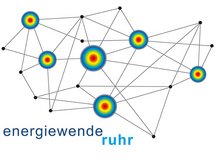Municipalities in the Ruhr area are confronted with the complex task of implementing the German energy transition against the background of a multitude of social, economic, cultural, and ecological challenges. The Ruhr area as a region is one of the largest agglomerations in Germany. It is characterised by a disparate settlement structure and has been shaped by a common industrial-cultural heritage. The spatial unity of energy sources (coal), energy supply, and energy-intensive industry resulted in a corresponding integrated economy and a specific infrastructure design. Up until today, this heritage reproduces itself in certain path dependencies and power structures.
The framework programme "Implementing the energy transition in municipalities of the Ruhr area", funded by Stiftung Mercator, had a transdisciplinary objective and set out to find answers to the following questions: How can municipalities be supported and empowered to advance the energy transition? How can processes of economic and social transition be used to foster emission reductions? Can the energy transition simultaneously serve as a catalyst, fostering more encompassing sustainable regional development? And if so, how? Paramount in answering those questions was to provide substantial guidance for local and regional stakeholders based on comprehensive scientific analysis. Over the course of three years, a scientific, interdisciplinary project consortium led by the Wuppertal Institute set out to answer those questions.
Amongst other things, the researchers recommend a comprehensive and participative roadmapping process for the region, which should be overseen by a newly formed steering group and accompanied by the establishment of an innovation or energy transition fund as well as an extensive monitoring system. These and additional specific recommendations have been condensed into three central products of the project: A brochure on how to manage the energy transition at local level (= "Energiewende regional gestalten"), an editor's volume on the region's agents of change for sustainability (= "Geschichten einer Region"), and an energy transition map of the Ruhr area visualising good practice examples (= "Landkarte Energiewende Ruhr"). Various subprojects and implementation projects resulted in additional products, both practice-oriented as well as for scientific purposes. The integrated model "Cities and climate change - Ruhr area 2050", for example, is capable of presenting different scenarios for future settlement and mobility development. Moreover, three action guidelines were published: (1) for contacting and addressing people with migrant backgrounds regarding opportunities for energetic refurbishment, (2) for designing the energy transition sensitive to issues of architectural culture, and (3) for the diffusion of cargo-bikes in local transport. Last but not least, a typology of neighbourhood potentials for energy efficient refurbishments was created for the entire Ruhr area.
For more information, please see the project website.

